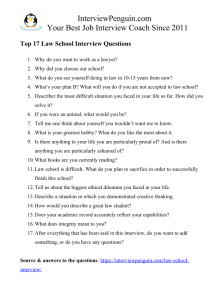Law school interview differs a lot to med school or vet school interviews. Prepare to sit in front of a small panel of smart people with big egos, who won’t give you a second chance. They do not need to, because when you do anything wrong, there are always 1,000 other people waiting for their opportunity, ready to pay hundreds of thousands of dollars for their law education, for their ticket to a prosperous career and professional recognition.
Before anything else, you should also realize one thing: Big egos are attracted to other big egos. Humility may work great in PT school interviews, and in many interviews for actual jobs, but it won’t do you much good at law school. Here you should be ready to boast about your skills, and to convince the admission committee that you have something special in you, the X factor, that sets you apart from the rest of the applicants. Or at least that you believe to belong to the elite group.
They will typically ask you from 10-20 questions, but sometimes it can be less, especially if they aren’t impressed. Some questions will relate to your career choice and their school, other to your personality, and attitude to certain situations that may happen during your studies, or once you practice law. You may also deal with some odd questions, questions you would likely not expect. They try to catch you off guard, and see your spontaneous reactions.
Let’s have a look at some of the questions right now, and what you should focus on while answering them.
Table of Contents
Why do you want to work as a lawyer?
Any general answer is a bad answer. You won’t impress them saying something they’ve heard a hundred times over, such as that you want to help people, or fight injustice, or do something for your country. Such answers would do if you competed with five other applicants. That’s not the case at law school, however. So let me give you some other ideas.
First one is telling them a story. A story of your life. Perhaps you experienced injustice, something you still suffer from. Or you (or someone from your family) have been involved in tricky legal proceedings, and a great lawyer helped them get out of it, bruise and battered, but alive and free man.
Simply something strong that happened to you, or you experienced, perhaps on the playground of international law, place where destinies of entire nations or countries are at stake. This experience had a profound impact on you, and it inspired you pursue a career of a lawyer. Because you also want to have a BIG impact in your life.
Second option is outlining in particular what you want to do–and why. I talk about specialization here. And again, you should aim for something big. Saying that you’d like to end up working for United Nations or for the US Government is a goal that’s ambitious enough to make the big egos in your admission committee stir. Of course to get there you must obtain a degree from an excellent Law School–the one with which you are applying right now…
* May also interest you: Why do you want to be a lawyer? 7 sample answers
Why did you choose our school?
Big egos like praise. And loads of it. You should do a good research and find at least three things in which their school stands out, when compared to other prestigious law schools. But again, you should be specific in your answer. Saying that they have the best reputation, or that their name rings in the ear when anyone hears “law school” won’t be enough.
Pick particular courses from their curriculum, name a few professors you’d love to see teaching you, or point out specific research papers they published in the recent years. The more specific you are, the better your answer will be.
There’s also one risky strategy you can try at this point. It can do wonders, but it can also send you home packing. The strategy is brutal honesty, combined with praise. Maybe you do not go to Harvard because you can’t afford to pay their ridiculous tuition.
And who cares about Harvard? It’s just the bubble anyway, and you believe that at this school (the one you interview at) one will find professors of the same quality, or maybe even better.
Or perhaps with your GPA you do not have a chance to get to one of the top 3 law schools–top 3 in terms of ratings. But you don’t care about some stupid ratings. You believe that academic record never tells the entire story, and you choose their school exactly because they are smart enough to give a chance in an interview also to people with lower GPA.
* May also interest you: Why did you choose this university? 7 sample answers.
What do you see yourself doing in law in 10-15 years from now?
As I already mentioned, the more specific you are, the better. Because law school is hard, and if you are motivated only by a vision of a six figure salary, you may as well experience and burnout and drop out, or leave (and perhaps become new Bill Gates, who also didn’t finish his university studies).
Anyway, choose your area of law, perhaps even court, type of cases you’d like to work on, or even an organization you’d love to work for. And why not be ambitious, saying that you see yourself leading the best law firm in New Jersey, or in Texas?
Don’t forget that big egos are attracted to other big egos. Members of the hiring committee like applicants who dream big. That’s why should be ambitious when it comes to your future plans.
What’s your plan B? What will you do if you are not accepted to law school?
I will follow my line also with this answer: Say them that you do not waste your time thinking about possible negative outcomes. You have a strong confidence, you believe in your abilities, and see no reasons why you may not end up accepted to law school this year.
Surely, it can happen, if the members of the admission committee are blind or deaf. So if it happens, if you are rejected, you will think about your future plans. But at the moment you focus only on your interviews, and believe that you will succeed.
Another alternative is talking about some unique plan, something that will make them wonder. Perhaps your plan B is to leave for a country in the Far East, India or Nepal, and live in a hermitage for a year, meditating on life, and on stupidity of the committee who didn’t let you in.
Or you want to work for some particular non-profit that will allow you to spend time with people who face a lot of adversity in their lives. This will allow you to escape the bubble of your perfect life, at least for a while, and see how things really are in the world, for most people, who weren’t as lucky as the guys in $1K jackets sitting opposite to you right now.
Maybe your plan B is some innovative startup. You have some disruptive idea on your mind, something that could change the status quo in a certain field of economy. You will give it a shot if they do not accept you. And if it doesn’t pan out, if you make just one million instead of hundred million, buying yourself a golden parachute when your startup bankrupts, you will at least have enough money to pay the ridiculously high tuition at their school, or to basically buy your way in.
Describer the most difficult situation you faced in your life so far. How did you solve it?
Real life experiences are unbeatable. I mean, if you’ve always been a perfect student, and enjoyed a love of your parents, and everything was perfect to this point of your life–you are very lucky. But you may also struggle with your answer to this question.
Think about your life. Have you, or someone you loved, suffered from a difficult health issue? Have you lost someone you cared for? Have you perhaps experienced an identity crisis? Or have you been on your way to the stars, half way up, just to eventually lose everything, and now the best option you have is applying for some law school, where you may not even get?
We learn the most in difficult situations. Overcoming adversity, we mature as human beings. And that’s exactly what they are looking for–to see that you’ve been through some hard times, overcome the difficulties. And so when you experience hard times at Law School, you will have enough strength to push through.
That’s what they are looking for in your answer. But were you (un)lucky enough to experience such a difficult situation in your life?
There are 1,000 other applicants for this study program. Why should we choose you?
At the end of the day, everyone cares for their business. They want the best students, famous lawyers in the making. Because such people bring recognition, reputation, which means more applicants, higher tuition, and better profits for the school–that’s the most important thing, of course.
Now, you have two options. First one is referring to your past. Have you won any state, national, or international competitions? Have you earned exceptional scores in some tests or exams? Have you, in your own say, stood out from your peers, with something you did or achieved during your undergrad studies?
Second option is referring to the future, and what you want to do for their school. Perhaps you are an excellent athlete and want to represent their colors in national competitions. Or you aspire to organize some events for fellow students or educators.
Or your father happens to be a multi millionaire, and if they give you the place in their study program, they can be sure that their school will have a new patron.
Show them that you do not want to only take. You also want to give back to the community at Law school, either by actively participating in the campus life, organizing events or applying for jobs, or by representing school in various competitions…
Other questions you may get while interviewing at Law School
- If you were an animal, what would you be?
- Tell me one think about yourself you wouldn’t want me to know.
- What is your greatest hobby? What do you like the most about it.
- Is there anything in your life you are particularly proud of? And is there anything you are particularly ashamed of?
- What books are you currently reading?
- Law school is difficult. What do you plan to sacrifice in order to successfully finish this school?
- Tell us about the biggest ethical dilemma you faced in your life.
- Describe a situation in which you demonstrated creative thinking.
- How would you describe a great law student?
- Does your academic record accurately reflect your capabilities?
- What does integrity mean to you?
- After everything that has been said in this interview, do you want to add something, or do you have any questions?
* You can also download the full list of questions in a one page long PDF, and practice your interview answers anytime later, even when offline:

Conclusion, next steps
Acceptance rate is pretty low at the most prestigious law schools (below 15%), and quite low (around 30% in average) at “ordinary” law schools.
You will always compete with many people for your place in the study program. Once you have excellent GPA and proven track record of successes as a student, you can opt for typical interview answers, and you will get in.
But if your academic record doesn’t shine through, and if you had also some life outside of school, and didn’t really participate in competitions or anything similar, you should try to come up with unique answer that will stand out. And that’s exactly why I tried to show you in this article.
Do not be afraid to take risks, to challenge your interviewers intellectually. If you aren’t an exceptional student and give them average (typical) interview answers, they won’t accept your application. But if you are brave enough to come up with some unorthodox answers, you can still make it and get in, even with lower GPA…
I wish you good luck!
Matthew
May also interest you:


